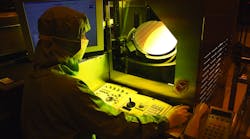TSMC announced a new 6-nanometer node aimed at maintaining its dominance over the roughly $60 billion made-to-order chip business. TSMC said Tuesday that its new production process gets more performance per dollar out of chips designed for high-end smartphones and data centers compared to 7-nanometers, which entered volume production last year. The company produces processors for Apple, Nvidia, Huawei and many others.
Chips based on 6-nanometers can deliver 18% more logic density than chips using its 7-nanometer node at the same power and performance. Customers can also take advantage of the same tools that they use on to create 7-nanometer chips, allowing them to port 7-nanometer designs to the 6-nanometer process. TSMC says 5-nanometers will be even more advanced, delivering 45% smaller area, 15% more performance and 20% lower power.
Kevin Zhang, the company's VP of business development, said that "TSMC N6 technology will further extend our leadership in delivering product benefits with higher performance and cost advantages beyond the current N7." He added: "our customers will able to quickly extract even higher product value from the new offerings by leveraging a well-established design ecosystem today." Initial 6-nanometer production is slated to start in the first quarter of 2020.
TSMC is trying to tighten its grip over contract chip manufacturing amid a slowdown in Moore's Law, the semiconductor industry's playbook for producing smaller, faster and cheaper computer chips. TSMC's 7-nanometer node has taken over as the industry's standard as Intel's 10-nanometer process has faced significant delays. Intel, which is still trying to escape from a manufacturing crisis, plans to start selling 10-nanometer chips before the end of 2019.
Other major chip manufacturers have struggled. Globalfoundries, the No.3 contract chip manufacturer, discontinued its 7-nanometer process amid ballooning costs last year. The move came after Globalfoundries also shut down its 10-nanometer process, which it said was too costly when weighed against its potential performance and power boosts. Under CEO Thomas Caulfield, the company has turned its focus to the 14- and 22-nanometer nodes.
Samsung is trying to close the market share gap with TSMC, which controls 48.1% of a market Gartner estimates will reach $85 billion by 2022. On Tuesday, Samsung said that it could start sampling chips based on its 5-nanometer node, which combines 25% higher area efficiency with 20% lower power or 10% better performance than 7-nanometers. Samsung also plans to offer its 6-nanometer node as an alternative to TSMC's.
While Samsung is aiming to gain ground in contract chip manufacturing, TSMC is trying to widen its market lead. TSMC won over Apple, Huawei and Qualcomm last year when it introduced 7-nanometers ahead of its competitors. TSMC said that the 7-nanometer node accounted for 22% of its total sales in the first quarter of 2019. But the battle is shifting to smaller, faster and increasingly complex computer chips, such as 5-nanometers, that cost more to make.

